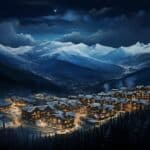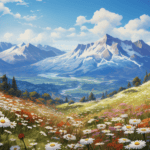Whistler isn’t just for snowboarders and skiers; it’s a vibrant canvas painted with Canada’s incredible wildlife. From the elegant flight of migratory birds to the quiet steps of bears emerging from hibernation, Whistler offers nature lovers a front-row seat. If you’ve got the keen eyes and the heart for wild adventures, then strap on your hiking boots and grab those binoculars. We’re about to embark on a seasonal journey through Whistler’s wilderness.
Intro: The Magic of Whistler’s Wildlife
Nestled amidst the towering peaks of British Columbia, Whistler teems with life in every nook and cranny. This region, revered by winter sports enthusiasts worldwide, holds a deeper secret – a thriving ecosystem that captures the true essence of Canadian wilderness.
Picture this – a serene morning where the first rays of sunlight dapple the forest floor, revealing the scampering squirrels or a family of deer grazing without a care. The background music? A melodious symphony of birds celebrating the dawn. It’s not just the landscape that’s awe-inspiring here; it’s the life that it sustains.
But what makes Whistler such a hotspot for wildlife enthusiasts? The answer lies in its unique location and diverse habitats ranging from alpine meadows to dense forests, and from tranquil lakes to bustling rivers. Every season brings forth a different set of actors on this grand stage of nature, ensuring that there’s always a new spectacle waiting around the corner.
Key Takeaway: Whistler is not just a tourist hotspot; it’s a vibrant sanctuary for diverse wildlife, ensuring year-round opportunities for unique sightings and experiences.
Understanding Canada’s Wildlife Calendar
In Canada, especially regions like Whistler, the change of seasons isn’t just about switching your wardrobe. It’s about the shifting rhythms of nature. The calendar of wildlife activity in Whistler is tightly interwoven with the seasons, each offering unique opportunities for observation.
Spring marks the end of hibernation. The land wakes up, and so does its fauna. Migratory birds make their triumphant return, while mammals shake off their winter slumber, making it a time of rejuvenation.
As summer arrives, the full splendor of Whistler’s wildlife is on display. The longer days and warmer temperatures make it a bustling time, with animals actively foraging, mating, and raising their young.
Fall in Whistler is a period of preparation. Animals sense the impending cold, gathering food, or migrating to warmer locales. It’s a period of transition, as the hues of the leaves change, so do the activities of the animals.
And then comes winter. A quiet, serene time where the land is blanketed in snow. Yet, life persists. Some animals hibernate, while others have adapted to thrive in this chilly wonderland.
Each season offers a different chapter in the story of Whistler’s wilderness. By understanding this calendar, you’re better equipped to know when and where to look, enhancing your wildlife-watching experience.
Key Takeaway: Each season in Whistler offers a unique glimpse into the lives of its fauna. Knowing the rhythm of nature enhances the wildlife-watching experience.
Why Whistler is a biodiversity hotspot
It’s no coincidence that Whistler boasts such a rich tapestry of life. Geographical, climatic, and ecological factors all play a role in making it a biodiversity hotspot. Located in the Coast Mountains of British Columbia, Whistler enjoys a range of elevations and habitats. This variety ensures that creatures of all kinds find a suitable niche.
Moreover, Whistler’s numerous freshwater systems, from serene lakes to babbling brooks, attract a plethora of animals. These water bodies serve as both a source of sustenance and a habitat for aquatic creatures.
Additionally, the region’s ancient forests of cedar, hemlock, and spruce provide shelter and food for numerous species. The result? A stunning array of biodiversity that would make any nature lover’s heart flutter.
Key Takeaway: Geography, diverse habitats, and pristine water bodies are the cornerstones of Whistler’s rich biodiversity.
Importance of wildlife conservation and respect
With great beauty comes great responsibility. While it’s exhilarating to encounter a bear or spot a rare bird, it’s imperative to remember that we’re visitors in their home. Wildlife disturbances can have serious implications. For instance, if bears associate humans with food, it increases the chances of dangerous encounters.
Respect also means being informed. Understand the wildlife protection regulations set by Canadian authorities. Treading lightly, minimizing noise, and keeping a safe distance ensures that we can coexist harmoniously.
Furthermore, supporting local conservation efforts can make a difference. By being conscious visitors, we can ensure that the magic of Whistler’s wildlife endures for generations.
Key Takeaway: Respect and knowledge are key to harmonious coexistence with Whistler’s vibrant wildlife.
Where did Whistler BC get its name?
Whistler, British Columbia got its name from the shrill whistle sound made by the western hoary marmots that live in the area. The settlers started calling the area “Whistler” because of this distinctive sound. The original name of the area was Alta Lake. In 1965, the name of Whistler Mountain, located near the town, was officially changed from London Mountain to Whistler Mountain to represent the whistling calls of the marmots. The name Whistler has since been used for both the mountain and the town.
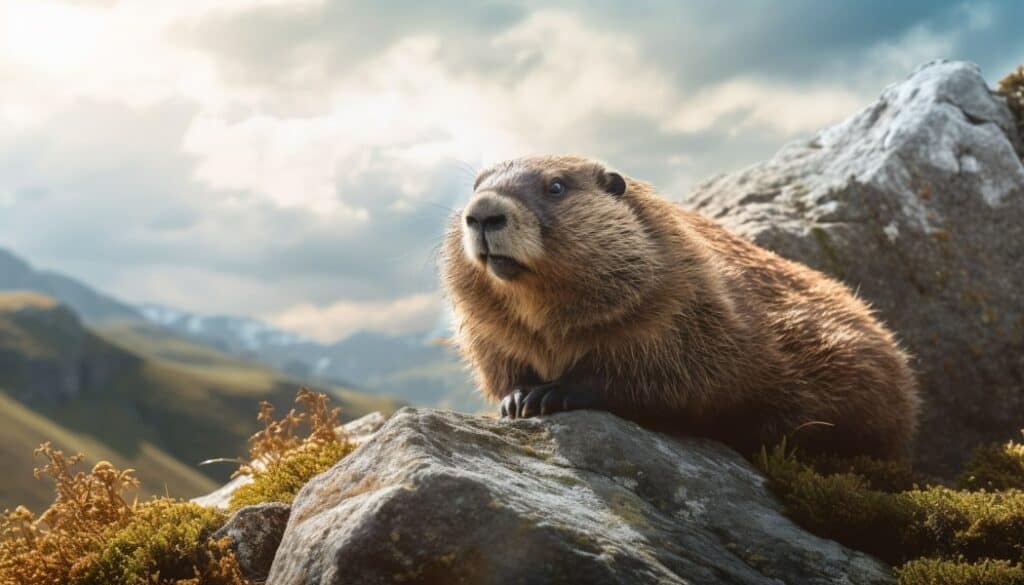
Springtime Surprises: Revival of the Wilderness
Bird migration: Who’s returning?
The skies of Whistler come alive in spring. Birds of various shades and sizes make their triumphant return. From the melodious songbirds to the majestic raptors, springtime becomes a birdwatcher’s paradise. Some notable returnees include:
- Bald Eagles: Their powerful wings cutting through the sky is a sight to behold.
- Hummingbirds: These tiny dynamos are a delight to watch, especially when they hover around seeking nectar.
- Warblers: With their intricate melodies, they add a distinct soundtrack to the Whistler spring.
Keeping a journal or a camera can be a great way to document these fascinating migrations.
Emerging mammals: Bears, squirrels, and more
As the snow melts and the ground warms, the mammals of Whistler start to stir. Spring is particularly famous for the emergence of the iconic black bear from its winter-long hibernation. However, bears aren’t the only stars:
- Squirrels: Watch them scamper around, collecting food and playing chase.
- Marmots: Recognizable by their sharp, whistling calls.
- Deer: These graceful creatures can be spotted grazing in meadows and forest edges.
Remember to maintain a safe distance and never approach or feed wildlife.
Key Takeaways:
- The awakening of mammals is a true testament to nature’s resilience and the cyclical beauty of life.
- Spring sees the return of diverse birds, making Whistler a haven for bird enthusiasts.
Summer Spottings: The Animal Kingdom in Full Swing
Active marine life: Lakes and rivers
Summers in Whistler aren’t just about hiking and mountain biking. The region’s freshwater systems come alive with a rich tapestry of marine life:
- Salmon: Their upstream migration is a phenomenal sight, showcasing determination and the circle of life.
- Otters: These playful creatures can often be seen frolicking in water bodies.
- Frogs and toads: The rhythmic croaking serves as the background score for many a summer night in Whistler.
Whether you’re kayaking, fishing, or just lakeside picnicking, always be respectful of the aquatic environment.
Spotting alpine creatures: Tips and places
Whistler’s alpine regions, with their stunning vistas, are also home to a range of specialized creatures. Summer is the best time to spot:
- Marmots: Often seen sunning on rocks.
- Mountain Goats: Their white coats contrast beautifully against the rugged terrain.
- Ptarmigans: These birds blend seamlessly with the alpine landscapes.
When venturing into alpine zones, stick to trails to minimize environmental impact.
Key Takeaways:
- The waters of Whistler brim with life in summer, offering a different dimension to the area’s biodiversity.
- Whistler’s alpine regions offer unique wildlife spotting opportunities, blending the thrill of heights with the joy of discovery.
Fall Forays: Preparations for the Cold
Gathering and nesting behaviors
As the golden hues of fall paint the Whistler landscape, animals busily prepare for the impending winter. This season witnesses a flurry of activities:
- Bears: They forage extensively, gorging on berries and salmon to build fat reserves for hibernation.
- Birds: Species like robins and sparrows gather materials to fortify their nests against the chill.
- Beavers: These industrious creatures fortify their dams, ensuring a cozy and watertight home.
Observing these preparatory behaviors offers insights into nature’s in-built survival mechanisms.
A spectacle of changing fur colors
Fall isn’t just about the foliage; many animals undergo fascinating transformations:
- Snowshoe Hares: Their brown summer coats gradually turn white, providing camouflage against the snow.
- Ermines: Similarly transition from brown to snowy white, becoming nearly invisible in winter landscapes.
- Deer: Shed their summer coats for thicker, warmer ones, better suited for the colder months.
This adaptability showcases the incredible evolutionary tactics of Whistler’s fauna.
Key Takeaways:
- Fall in Whistler is a bustling time as animals gather resources and ready themselves for winter.
- As trees shed leaves and prepare for winter, animals too don transformative coats, merging with the changing landscape.
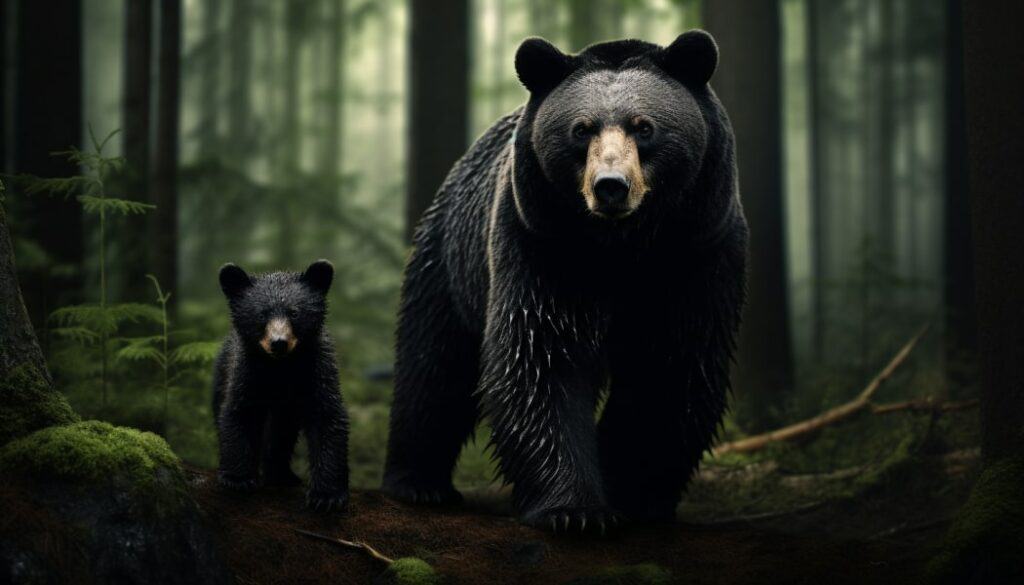
Wintertime Wonders: Silent Observers Amidst the Snow
Hibernation versus adaptation
Winter in Whistler is a serene spectacle, with a blanket of snow covering the landscape. Many animals adapt in unique ways:
- Hibernation: Animals like bears and some rodents enter a deep slumber, conserving energy.
- Adaptation: Others, such as lynxes with their wide feet (natural snowshoes!), have evolved to thrive in snowy conditions.
Understanding these survival strategies offers a deeper appreciation of the resilience of nature.
Owls, lynxes, and elusive winter fauna
While many animals lay low during the winter, some steal the spotlight:
- Owls: Species like the Snowy Owl and Barred Owl hunt silently, their calls echoing in the still night.
- Lynxes: With tufted ears and furry feet, they stalk prey in the snowy wilderness.
- Wolverines: Rare but present, these tenacious carnivores traverse large territories in search of food.
When exploring, tread lightly, leaving no trace, ensuring these creatures’ habitats remain undisturbed.
Key Takeaways:
- Winter is not a dormant season; it’s a testament to the incredible adaptability and survival instincts of Whistler’s wildlife.
- Even in the depths of winter, some animals brave the cold, showcasing nature’s enduring spirit.
Ethical Wildlife Watching: Do’s and Don’ts
Keeping a safe distance
The allure of Whistler’s wildlife is undeniable, but safety should always come first – for both humans and animals:
- Photography: Always use a zoom lens; never approach animals to get a “better shot.”
- Viewing spots: Utilize designated wildlife viewing areas where available.
- Avoid sudden movements: Be predictable; sudden moves can startle and stress animals.
The effects of feeding wildlife: Why it’s a big NO
Feeding wildlife, though often done with good intentions, can have severe repercussions:
- Dependency: Animals can become reliant on human-provided food, leading them to lose their natural foraging instincts.
- Health issues: Human food isn’t nutritionally suitable for wild animals and can cause health problems.
- Human-animal conflicts: Animals associating humans with food can lead to dangerous encounters.
What to do if confronted by a wild animal
Encounters can be unpredictable. Here’s what to do if you find yourself face-to-face with wildlife:
- Stay calm: Panicking can escalate the situation.
- Speak softly: This lets the animal know you’re human and not a prey item.
- Avoid direct eye contact: Some animals might interpret this as a threat.
- Back away slowly: Don’t turn your back, but slowly increase distance between you and the animal.
Key Takeaways:
- The key to a memorable wildlife experience is respect. Keep a distance and prioritize safety.
- It’s essential to remember that wild animals have survived for ages without human intervention. Feeding them does more harm than good.
- Knowledge is the best defense. Being aware and prepared can ensure safe encounters.
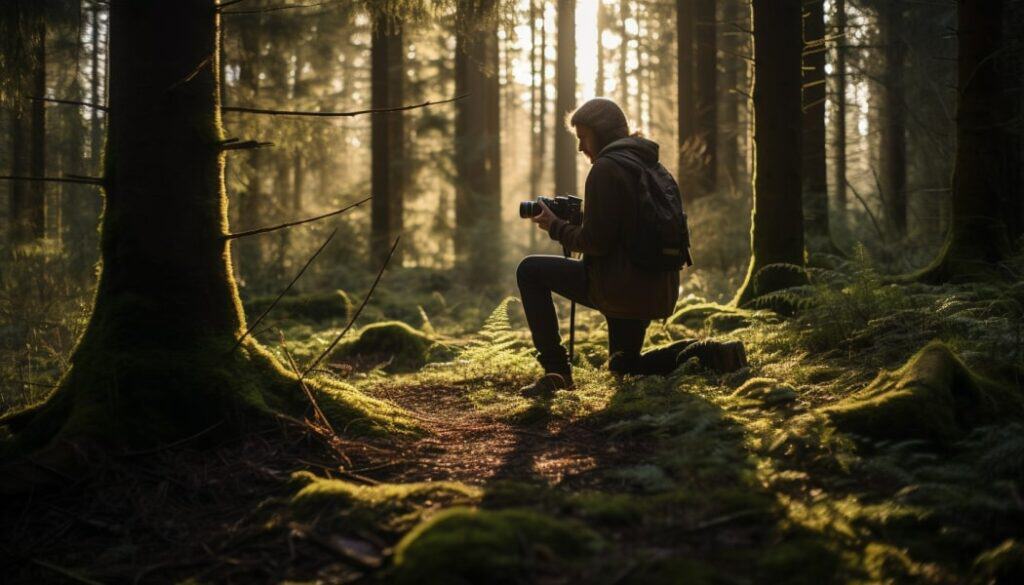
Contribute to Conservation: How Tourists Can Help
Donating to local wildlife funds
Supporting local initiatives is a direct way to contribute:
- Whistler Wildlife Protection Fund: This fund directly aids in habitat preservation projects.
- Adopt-an-Animal programs: By sponsoring an animal, you can ensure its well-being and conservation.
Participating in community clean-ups
Joining local clean-ups helps in preserving habitats:
- Beach clean-ups: Keep Whistler’s aquatic habitats pristine.
- Forest initiatives: Participate in tree planting or trail restoration projects.
Endorsements: Top Wildlife Tours & Local Businesses
Choosing eco-friendly tour operators
When deciding on a tour, consider operators who practice sustainable tourism:
- Whistler EcoTours: Known for their green initiatives and knowledgeable guides.
- Whistler Photo Safari: They prioritize animal safety and habitat preservation in all their tours.
Revel in the Wild: Concluding Thoughts
The joy of witnessing nature in action
Whistler offers a chance to truly connect with the wild. Every rustle in the bushes, every birdcall, is a reminder of the vibrant life that thrives here.
Our shared responsibility for coexistence
Visitors and locals alike have a part to play in ensuring that this coexistence between humans and wildlife remains harmonious.
Key Takeaways:
- Active participation fosters a sense of community and helps maintain Whistler’s natural beauty.
- As stewards of the earth, it’s up to us to ensure that future generations can experience the magic of Whistler’s wildlife.
Frequently Asked Questions
How do I report wildlife harassment?
If you witness any form of wildlife harassment in Whistler, it’s vital to report it immediately. Contact the British Columbia Conservation Officer Service at their hotline or through their online platform. Remember, timely reporting can make a significant difference in ensuring the safety and well-being of the animals.
What’s the best time of day for wildlife viewing?
While animals are active throughout the day, dawn and dusk — often referred to as the “golden hours” — are peak times. This is when many animals are most active, hunting, foraging, or playing. However, always prioritize safety and consider the habits of specific species when planning your viewing.
How can I learn more about local species?
The Whistler Naturalists Society offers a plethora of resources, including field guides, workshops, and educational programs. They’re dedicated to fostering a deeper appreciation for Whistler’s rich biodiversity.
Are there any restrictions on photography?
While photography is encouraged, always prioritize animal welfare. Use a zoom lens, avoid flash (as it can startle animals), and never bait or chase animals for a shot. Some sensitive areas may have additional restrictions, so always respect signage and guidelines.
Can I volunteer with local wildlife organizations?
Absolutely! Many organizations in Whistler welcome volunteers. The Whistler Biodiversity Project, for instance, frequently hosts bio-blitz events, where locals and tourists alike can contribute to citizen science initiatives.
Sources & References
- “Home | Whistler Naturalists.” Whistlernaturalist, 2015, www.whistlernaturalists.ca/. Accessed 23 Aug. 2023.
- “Conservation Officer Service – Province of British Columbia.” Gov.bc.ca, 2023, www2.gov.bc.ca/gov/content/environment/natural-resource-stewardship/natural-resource-law-enforcement/conservation-officer-service. Accessed 23 Aug. 2023.
- and, Environment. “About the Canada Wildlife Act – Canada.ca.” Canada.ca, 2017, www.canada.ca/en/environment-climate-change/services/environmental-enforcement/acts-regulations/about-wildlife-act.html. Accessed 23 Aug. 2023.
- “Home.” Whistler Eco Tours, 28 Apr. 2023, www.whistlerecotours.com/. Accessed 23 Aug. 2023.
- Whistler Photo Safaris. “Whistler Photo Safaris.” Whistler Photo Safaris, 2023, www.whistlerphotosafaris.com/. Accessed 23 Aug. 2023.
